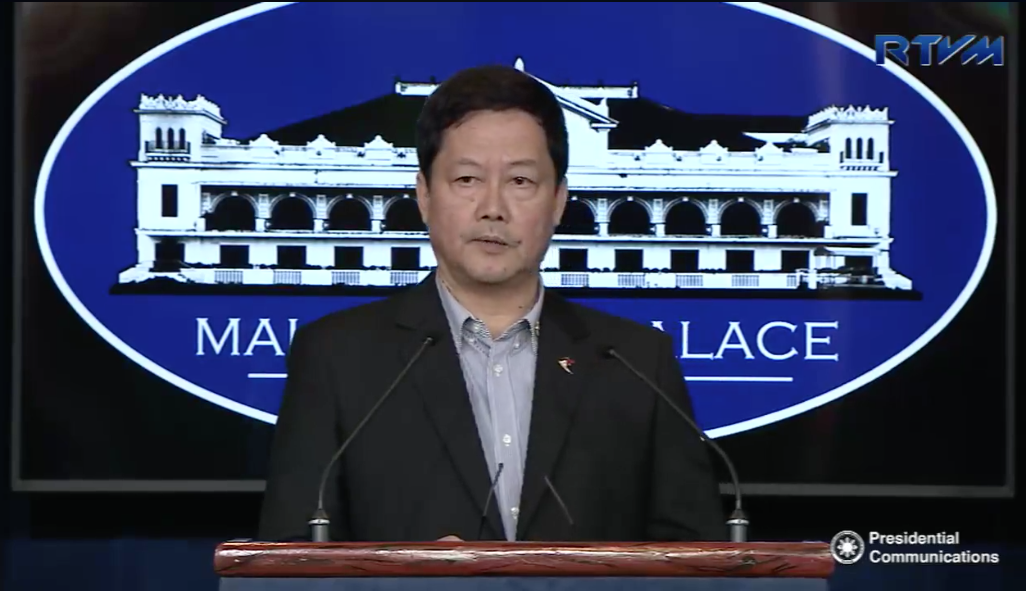
Guevarra was reacting to reports that convicted rapist, former Calauan, Laguna mayor Antonio Sanchez, is among those who will be entitled to an earlier release from prison under the new GCTA rules set by the SC ruling. (PCOO photo)
MANILA — Department of Justice (DOJ) Secretary Menardo Guevarra on Wednesday clarified issues raised following the implementation of a recent Supreme Court (SC) decision, which effectively shortened the prison terms of convicted persons deprived of liberty (PDLs) – through more liberal rules in computing good conduct time allowance (GCTA).
“NBP (New Bilibid Prison) records on good conduct of PDLs had been in existence before the Supreme Court issued its ruling on retroactivity of GCTAs last June,” Guevarra said in a message to newsmen.
Guevarra was reacting to reports that convicted rapist, former Calauan, Laguna mayor Antonio Sanchez, is among those who will be entitled to an earlier release from prison under the new GCTA rules set by the SC ruling.
“The matter of computation of GCTA is therefore purely ministerial. I have no reason to believe that the intervention of any person, including Secretary (Salvador) Panelo, will be necessary,” Guevarra said, referring to the presidential spokesperson, who was formerly defense counsel of Sanchez.
In January 1999, the High Court affirmed a lower court’s ruling, which found Sanchez guilty for the 1993 rape-slay of University of the Philippines (UP) Los Banos student Eileen Sarmenta and the killing of her boyfriend, Allan Gomez.
In August of the same year, the High Court also meted a double life term for Sanchez for a different case. This means that Sanchez will have to spend a total of 360 years in detention for all these cases.
The Sanchez case, among others, prompted Congress a few years later to pass the Heinous Crimes Act ot Republic Act 7659, which imposed the capital penalty of death.
Guevarra also clarified that the process is implemented sequentially according to who went to prison in Bilibid first.
“(It’s) First in, first out,” the secretary said, adding that the Bureau of Corrections has started processing records of 1993 PDLs at a rate of around 200 PDLs a day.
Guevarra dismissed talks that the 11 inmates, who testified against Senator Leila de Lima in her indictment for allegedly running a protection racket for drug lords inside the NBP, will get reduced sentences.
“Everyone imprisoned by final judgment before 2013 is entitled to a recomputation of GCTAs earned, if any.
If the subject 11 convicts qualify for a reduced sentence due to GCTA and they have actually served it, they too will be released,” he said.
“The reduced sentence is a reward for good conduct, not for any other reason. It’s the law and the SC ruling that freed them not PRRD, ” he added.
On June 25, the SC, through a decision penned by Associate Justice Diosdado M. Peralta, declared invalid Section 4, Rule 1 of the Implementing Rules and Regulations (IRR) of Republic Act 10592 amending portions of the Revised Penal Code.
The said IRR provided for the prospective application of the GCTA of prisoners for: good conduct, study, teaching, and mentoring service, and loyalty.
As a consequence, all prisoners – regardless of whether already serving his/her sentence or undergoing preventive imprisonment – may qualify for the reduction of their sentence pursuant to the time allowances under Republic Act 10592.
Republic Act 10592 expanded the application of the good conduct time allowance for prisoners even during preventive imprisonment and increased the number of days that may be credited for good conduct time allowance.
It also allowed additional deduction of 15 days for each month of study, teaching, or mentoring service, and expanded the special time allowance for loyalty and made it applicable even during preventive imprisonment.
The IRR was jointly issued by former Justice Secretary de Lima and former Interior Secretary Mar Roxas.
However, Section 4, Rule 1 of the IRR directed the prospective application of the GCTA, time allowance for study, teaching, and mentoring; and special time allowance for loyalty to prisoners.
The said provision in the IRR was struck down by the SC, which stressed that it ran counter to Article 22 of the Revised Penal Code – which entitles an accused to the retroactive effect of laws affecting them.






















